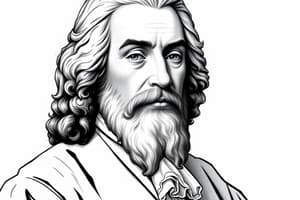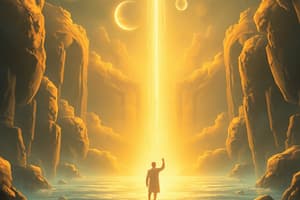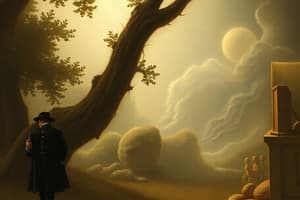Podcast
Questions and Answers
What is John Locke known as?
What is John Locke known as?
- The father of socialism
- The father of liberalism (correct)
- The father of conservatism
- The father of communism
What did Locke believe about the mind at birth?
What did Locke believe about the mind at birth?
- The mind is a blank slate (correct)
- The mind is fully formed
- The mind is a combination of nature and nurture
- The mind is pre-determined
What is Locke's theory of mind?
What is Locke's theory of mind?
- Identity and the self are pre-determined
- Identity and the self are a combination of nature and nurture
- Identity and the self are fully formed at birth
- Identity and the self are defined through a continuity of consciousness (correct)
What was Locke's position on slavery?
What was Locke's position on slavery?
What is Locke's theory of association?
What is Locke's theory of association?
What did Locke believe about property?
What did Locke believe about property?
What did Locke believe about money?
What did Locke believe about money?
What did Locke believe about education?
What did Locke believe about education?
What is Locke's influence on the United States Declaration of Independence?
What is Locke's influence on the United States Declaration of Independence?
Flashcards
John Locke's theory of mind
John Locke's theory of mind
Locke's theory that the mind is a blank slate (tabula rasa) shaped by experience, not innate ideas.
John Locke's influence
John Locke's influence
Locke's ideas greatly impacted political philosophy, particularly the concept of individual rights and limited government, and are crucial to the Declaration of Independence.
Tabula Rasa
Tabula Rasa
Latin for "blank slate"; a concept indicating the human mind's initial state is empty of knowledge and is shaped by experience.
Natural Rights
Natural Rights
Signup and view all the flashcards
Social Contract Theory
Social Contract Theory
Signup and view all the flashcards
Locke's Library Significance
Locke's Library Significance
Signup and view all the flashcards
"Two Treatises of Government"
"Two Treatises of Government"
Signup and view all the flashcards
Property as a Natural Right
Property as a Natural Right
Signup and view all the flashcards
Locke's economic philosophy
Locke's economic philosophy
Signup and view all the flashcards
Study Notes
John Locke: English Philosopher and Physician
-
John Locke was an influential Enlightenment thinker and is known as the "father of liberalism."
-
He was one of the first British empiricists and contributed greatly to epistemology and political philosophy.
-
Locke's theory of mind defined identity and the self through a continuity of consciousness.
-
He believed that at birth, the mind was a blank slate and that knowledge is determined only through experience derived from sense perception.
-
Locke was born in Wrington, Somerset, and attended Westminster School and Christ Church, Oxford.
-
He was a capable student but found modern philosophers more interesting than the classical material taught at the university.
-
Locke served as Secretary of the Board of Trade and Plantations and Secretary to the Lords Proprietors of Carolina, which helped shape his ideas on international trade and economics.
-
Locke was involved in politics and composed the Two Treatises of Government, which argued against absolute monarchy and for individual consent as the basis of political legitimacy.
-
His ideas about natural rights and government are reflected in the United States Declaration of Independence.
-
Locke's influence on political philosophy and modern liberalism is profound, and he had a strong influence on Voltaire, Alexander Hamilton, James Madison, Thomas Jefferson, and other Founding Fathers of the United States.
-
Locke's theory of association heavily influenced the subject matter of modern psychology.
-
Locke formulated a classic reasoning for religious tolerance, influenced by Baptist theologians like John Smyth and Thomas Helwys. However, he participated in drafting the Fundamental Constitutions of Carolina, which established a quasi-feudal aristocracy and gave Carolinian planters absolute power over their enslaved chattel property. Locke's positions on slavery have been described as hypocritical.Summary Title: John Locke's Contributions and Ideas
-
John Locke believed in social contract theory and that human nature is characterized by reason and tolerance.
-
He believed that property is a natural right derived from labor and that unused property is wasteful and an offense against nature.
-
Locke's general theory of value and price is a supply-and-demand theory, and he believed that money is regulated by its quantity.
-
Locke believed that silver and gold are the appropriate currency for international transactions and that a country should seek a favorable balance of trade.
-
He believed that the mind is a tabula rasa shaped by experience and that education is essential in making a person.
-
Locke was critical of Descartes's version of the dream argument, with Locke making the counter-argument that people cannot have physical pain in dreams as they do in waking life.
-
Locke was initially a Calvinist trinitarian but later advocated Socinian views on tolerance and Christology.
-
Locke's political thought was based on Protestant Christian views, and he derived the fundamental concepts of his political theory from biblical texts.
-
Locke compared the English monarchy's rule over the British people to Adam's rule over Eve in Genesis, which was appointed by God.
-
Locke's doctrine that governments need the consent of the governed is central to the Declaration of Independence.
-
Locke was an assiduous book collector and notetaker throughout his life, and he amassed a library of more than 3,000 books, which was distributed after his death.
-
Locke's contributions to philosophy, economics, and politics continue to be influential today.Locke's Library and Manuscripts at the Bodleian Library
-
Paul Mellon discovered Locke's library in 1951, supplemented it with books from Locke's library which he bought privately, and transferred his collection to the Bodleian in 1978.
-
Many of the books still contain Locke's signature and marginalia.
-
Only half of the books in Locke's library were printed in England, while close to 40% came from France and the Netherlands, covering a wide range of subjects.
-
The Bodleian library currently holds more than 800 of the books from Locke's library, including his copies of works by several of the most influential figures of the seventeenth century.
-
The Bodleian also possesses more than 100 manuscripts related to Locke or written in his hand, including letters to and from acquaintances, early drafts of Locke's writings, and unpublished works.
-
One of the largest categories of manuscript at the Bodleian comprises Locke's notebooks and commonplace books, which he organized according to topic.
-
Locke's notes are often abbreviated and full of codes, which he used to reference material across notebooks.
-
Locke personalized his notebooks by devising his own method of creating indexes using a grid system and Latin keywords.
-
Some of the books in Locke's library at the Bodleian are a combination of manuscript and print, with some books interleaved to enable annotations.
-
Locke interleaved and annotated his copy of Thomas Hyde's Bodleian Library catalogue, which he used to create a catalogue of his own library.
-
Locke's library has been a valuable resource for scholars interested in Locke, his philosophy, practices for information management, and the history of the book.
-
The Bodleian provides access to Locke's library and manuscripts to researchers and scholars.
Studying That Suits You
Use AI to generate personalized quizzes and flashcards to suit your learning preferences.




